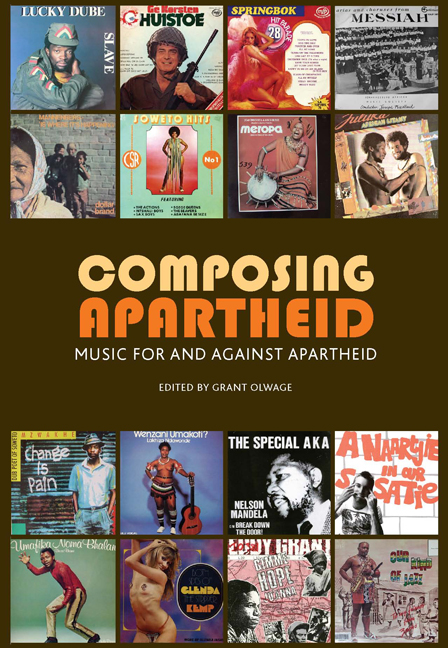Book contents
- Frontmatter
- Dedication
- Contents
- Acknowledgements
- Introduction
- Chapter 1 Back to the Future? Idioms of ‘displaced time’ in South African composition
- Chapter 2 Apartheid's Musical Signs: Reflections on black choralism, modernity and race-ethnicity in the segregation era
- Chapter 3 Discomposing Apartheid's Story: Who owns Handel?
- Chapter 4 Kwela's White Audiences: The politics of pleasure and identification in the early apartheid period
- Chapter 5 Popular Music and Negotiating Whiteness in Apartheid South Africa
- Chapter 6 Packaging Desires: Album covers and the presentation of apartheid
- Chapter 7 Musical Echoes: Composing a past in/for South African jazz
- Chapter 8 Singing Against Apartheid: ANC cultural groups and the international anti-apartheid struggle
- Chapter 9 ‘Nkosi Sikelel' iAfrika’: Stories of an African anthem
- Chapter 10 Whose ‘White Man Sleeps’ Aesthetics? and politics in the early work of Kevin Volans
- Chapter 11 State of Contention: Recomposing apartheid at Pretoria's State Theatre, 1990–1994. A personal recollection
- Chapter 12 Decomposing Apartheid: Things come together
- Chapter 13 Arnold van Wyk's Hands
- Contributors
- Index
Chapter 8 - Singing Against Apartheid: ANC cultural groups and the international anti-apartheid struggle
Published online by Cambridge University Press: 20 April 2018
- Frontmatter
- Dedication
- Contents
- Acknowledgements
- Introduction
- Chapter 1 Back to the Future? Idioms of ‘displaced time’ in South African composition
- Chapter 2 Apartheid's Musical Signs: Reflections on black choralism, modernity and race-ethnicity in the segregation era
- Chapter 3 Discomposing Apartheid's Story: Who owns Handel?
- Chapter 4 Kwela's White Audiences: The politics of pleasure and identification in the early apartheid period
- Chapter 5 Popular Music and Negotiating Whiteness in Apartheid South Africa
- Chapter 6 Packaging Desires: Album covers and the presentation of apartheid
- Chapter 7 Musical Echoes: Composing a past in/for South African jazz
- Chapter 8 Singing Against Apartheid: ANC cultural groups and the international anti-apartheid struggle
- Chapter 9 ‘Nkosi Sikelel' iAfrika’: Stories of an African anthem
- Chapter 10 Whose ‘White Man Sleeps’ Aesthetics? and politics in the early work of Kevin Volans
- Chapter 11 State of Contention: Recomposing apartheid at Pretoria's State Theatre, 1990–1994. A personal recollection
- Chapter 12 Decomposing Apartheid: Things come together
- Chapter 13 Arnold van Wyk's Hands
- Contributors
- Index
Summary
Introduction
In 1989, an in-house African National Congress (ANC) seminar in Lusaka heard Albie Sachs's thoughts on ‘Preparing Ourselves for Freedom’, beginning with his famously controversial proposition that the phrase ‘culture is a weapon of struggle’ be banned. The phrase was ‘not only banal and devoid of real content’, Sachs claimed, ‘but actually wrong and potentially harmful’. In explanation, he gave his impressions of the current state of ANC art: it confined itself to a narrow range of politically acceptable themes (‘fists and spears and guns’), portrayed the anti-apartheid struggle in simplistic terms of good and evil, and shunned nuance and ambiguity for ‘solemn formulas of commitment’. He insisted, however, that the very power of art lay in its capacity to expose complexity and contradiction; furthermore, the ideal art ‘is that which bypasses, overwhelms, ignores apartheid, establishes its own space’. As the promise of national liberation neared in the late 1980s, Sachs argued that art needed to be able to express not only the formulae of struggle, but also the richness and diversity of the newly emergent South African nation (1998).
Sachs – a highly respected lawyer and ANC activist whose pronouncements at this time carried particular weight, given his survival of an assassination attempt in 1988 – openly acknowledged that he had himself long endorsed the very conception of art as a ‘weapon of struggle’ that he now repudiated. A decade earlier, it had been legitimate and necessary to mobilise artists in service of the struggle, and this conception of culture had constituted an important focus for ANC thinking on the subject (Langa, 1990: 30). But the 1980s had seen the rise of an increasingly sophisticated discourse within the movement about the ways in which culture might contribute to the process of national liberation, as well as a steady increase in the number of publications, events, and institutions devoted to the issue. By the time Sachs delivered his call, culture occupied a firm place on the ANC's agenda. What he was emphasising was that the changing context of the struggle required a corresponding shift in how cultural activity was conceived and implemented.
This article takes its starting point approximately fifteen years earlier than Sachs's proclamation, when cultural life was still largely regarded within the ANC as peripheral to organised political activity.
- Type
- Chapter
- Information
- Composing ApartheidMusic for and against apartheid, pp. 155 - 184Publisher: Wits University PressPrint publication year: 2008



